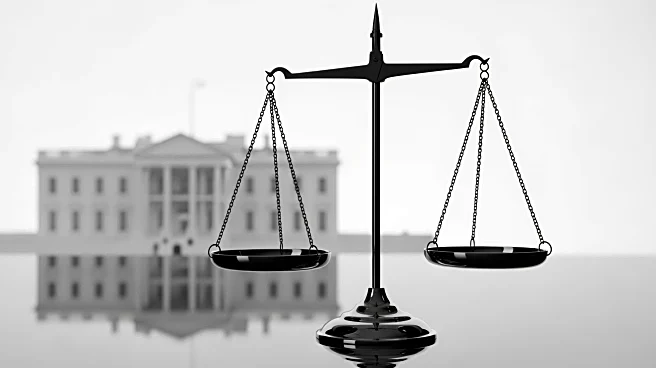What's Happening?
The Office of the United States Trade Representative is preparing for a potential Supreme Court decision that could limit President Trump's authority to impose tariffs under the International Emergency
Economic Powers Act (IEEPA). The administration has developed a backup strategy to maintain its global tariff regime by utilizing other trade statutes, such as Section 301 and Section 232, to exert pressure on U.S. trading partners and preserve tariff revenue. This includes opening investigations into Brazil's trade practices and delaying fees on Chinese vessels following a Section 301 investigation into China's shipbuilding practices. The administration is confident that the Supreme Court will uphold the president's tariff powers, but is ready to implement alternative measures if necessary.
Why It's Important?
The outcome of the Supreme Court case is significant as it could redefine the scope of presidential power in trade policy. If the court curtails the use of IEEPA, it could disrupt the 'America First' trade strategy and affect global negotiations that rely on tariff leverage. The decision could impact U.S. industries and international relations, as tariffs have been a key tool for the administration to negotiate trade deals and address national security concerns. A ruling against the administration could lead to a reevaluation of trade policies and potentially weaken the U.S.'s negotiating position on the global stage.
What's Next?
If the Supreme Court rules against the administration, the White House plans to use other legal avenues to impose tariffs, though these alternatives may be slower and face legal challenges. The administration has already initiated several investigations under different statutes to prepare for this possibility. The decision could prompt Congress to reconsider the extent of presidential authority over trade, potentially leading to legislative changes. Major trading partners are closely monitoring the situation, anticipating that the U.S. will find ways to maintain its tariff policies regardless of the court's decision.
Beyond the Headlines
The legal and political implications of the Supreme Court's decision could extend beyond trade policy, affecting the balance of power between the executive branch and Congress. The case highlights the interconnectedness of trade, economic, and national security policies, and raises questions about the appropriate use of emergency powers. The administration's reliance on tariffs as a foreign policy tool underscores the complexity of modern trade negotiations and the challenges of maintaining international agreements in a rapidly changing global landscape.








